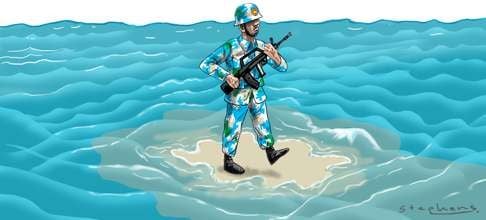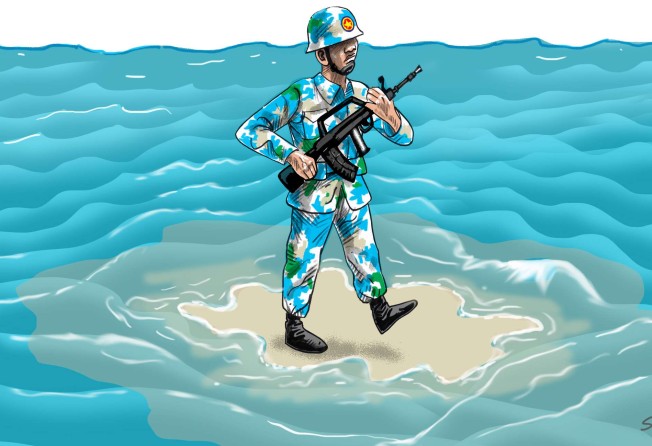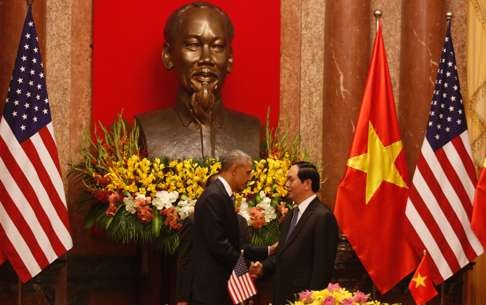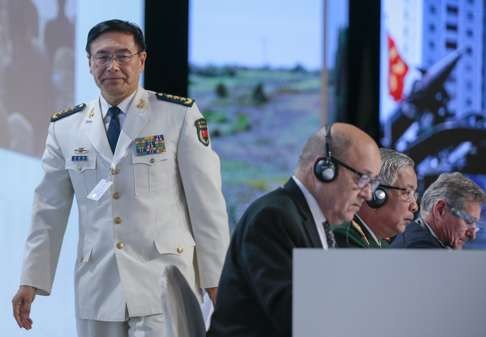
China is sailing solo on South China Sea issues, despite its claims to the contrary
William Choong and Alexander Neill say the messages and partnerships from the Shangri-La Dialogue show how, on South China Sea disputes at least, China is on its own in its reading of events


As the latest sign of international pushback against China’s assertive activities in the South China Sea, France announced it would urge European Union states to coordinate “regular and visible” naval patrols in the disputed area. After an absence of several years, the Indian and South Korean defence ministers spoke at the dialogue’s key plenaries. Singapore and India initiated their first-ever bilateral defence ministers’ dialogue on the sidelines. Four countries – Britain, Norway, Singapore and the US – jointly sponsored the launch of a Southeast Asian young leaders’ programme aimed at nurturing a generation of strategists immersed in the regional security debate.
Inevitably, however, the dialogue’s debate focused on the South China Sea. As tension increases in both the South and East China seas, the escalation-management protocols between China and the US and its allies will be tested. China recently sailed a navy warship for the first time into the waters surrounding Japan’s disputed Senkaku islands. In the skies above the East China Sea, the US and Japanese air patrols have been harassed recently at close quarters by Chinese jet fighters. Worryingly, it appears that China, facing increasing international isolation, is prepared to escalate the dispute to unprecedented levels.

China says Philippines should copy Malaysia’s ‘amicable’ way of handling disputes in South China Sea
This does not bode well for China’s reaction to a case that the Philippines has brought before the Permanent Court of Arbitration concerning Manila’s territorial dispute with China in the South China Sea. The ruling is expected to be announced in late July or August, and many believe the findings will largely fall in Manila’s favour.
The Chinese military delegation came to the dialogue with no flexibility in their position on the South China Sea. Admiral Sun Jianguo (孫建國), the deputy chief of the joint staff of the People’s Liberation Army, gave a disturbingly loud and defiant speech in a delivery targeted as much at a domestic audience as at an international one.
The American message delivered by US Secretary of Defence Ashton Carter was designed to rebut China’s accusations of “cold war mentality”, and give assurance that the US would remain the pre-eminent guarantor of regional security. Recently, for example, US President Barack Obama said the US would lift a long-standing ban on weapons exports to Vietnam. In the same vein, Carter called for China to avoid building a “great wall of self-isolation”. Such language is in tune with recent statements elsewhere by the US leadership describing how China’s coercion has driven regional players into America’s embrace.

Carter used the term “principled” 37 times to describe a regional security network consisting of like-minded countries. Adding weight to his message, defence ministers from countries such as Britain, Canada, France, South Korea and Singapore also echoed variations of his “principled security network” theme.
The current Sino-US tension underscores a deeper dynamic – an ongoing contest for power in the Asia-Pacific and a nascent security dilemma
Past clashes between China and the US at the dialogue have revolved around issues such as the PLA’s lack of transparency and US arms sales to Taiwan. But the current Sino-US tension over the South China Sea underscores a deeper dynamic – an ongoing contest for power and influence in the Asia-Pacific and a nascent security dilemma.
Chinese arguments over its position in the South China Sea have some merit. Contrary to American fears about China’s reclamation and military build-up in the South China Sea, PLA Major General Yao Yunzhu (姚云竹), speaking at the dialogue, said that freedom of navigation for commercial vessels there has not been challenged and would not be challenged. This is true; as she argues, China and the US have different views regarding the movement of military vessels within exclusive economic zones and territorial seas, but this does not affect commercial navigation.
She also chose a well-used line of attack against the US – since Washington has not ratified the United Nations Convention on the Law of the Sea, it is in no position to impose its interpretation of the treaty on other countries.

There is no rule in international law that specifically prohibits reclamation at sea. But between December 2013 and August 2015, China reclaimed 17 times more than other claimants have done in the past 40 years. And its growing network of ports, military buildings, gunnery and air bases has cast doubt on statements by President Xi Jinping ( 習近平 ) that China would not militarise reclaimed land. Nevertheless, Beijing has suggested that the trigger for the “necessary defence” of its artificial islands is continued US freedom of navigation operations and military overflight near its newly built bases in the South China Sea.
On the South China Sea, however, China is doing exactly what Admiral Sun said it would not do
Ultimately, China’s ambiguity over its “nine-dash line” claim to the South China Sea, and its lack of clarity over its intentions for the strategic waterway, is pushing many smaller countries in and outside the region to engage in more military cooperation with the US.
Admiral Sun argues that China has not isolated itself in the past, is not isolated and will not be isolated. Indeed, China is a significant contributor to regional security and prosperity. It is now the top trading partner of many Asian countries, is a key member of the East Asia Summit and is working hard together with the US on threats posed by a nuclear North Korea and climate change.
On the South China Sea, however, China is doing exactly what Admiral Sun said it would not do – building a wall that separates itself from the community of nations.
William Choong and Alexander Neill are senior fellows at the International Institute for Strategic Studies, which organises the annual Shangri-La Dialogue